‘Brain gain’ boom as Cambridge industry-academia interface generates $1.35 billion

Business Weekly’s ‘Brain Gain’ research focuses on money raised by Cambridge technology and life science game changers with roots in academic and institutional research organisations such as the University of Cambridge, Wellcome Sanger Institute, Cambridge Judge Business School and the MRC Laboratory of Molecular Biology (LMB).
Two particularly large transactions from Cambridge companies with relevant links stand out from the last 12 months – the $555 million harvested on Nasdaq in the US by Bicycle Therapeutics in May and the $300m raise that swept Quantinuum to multi-unicorn status in January.
Bicycle’s technology arose from research at the MRC Laboratory of Molecular Biology (LMB) in Cambridge. Quantinuum was originally known as Cambridge Quantum Computing (CQC) and was founded in 2014 through the University of Cambridge Judge Business School’s ‘Accelerate Cambridge’ programme.
Other Cambridge companies contributing to the $1.35bn total include Apollo Therapeutics, Cambridge Mechatronics, CellCentric, Echion Technologies, ExpressionEdits, GraphEnergyTech, Healx, Immaterial, Mission Therapeutics, Nu Quantum, Prospectral, Psyomics, Quotient Therapeutics, Riverlane, Sano Genetics, Sparxell, T-Therapeutics, ViaNautis, VividQ, Xampla and Zetta Genomics.
The major investment deals are listed chronologically from August 2024 and stretch back a calendar year.
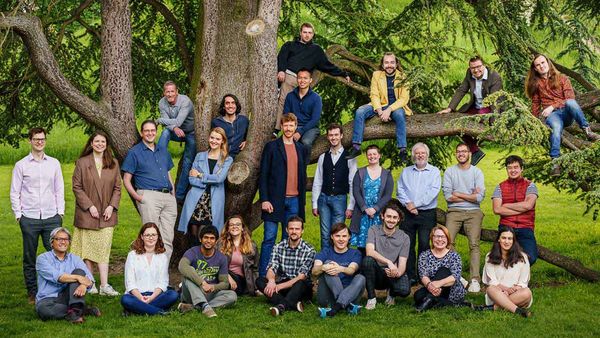
VividQ
$7.5m additional Series A (August 2024)
About: VividQ, a leader in computational holography, recently revealed images of real holograms projected through high-performance 4K display hardware. The ability to deliver ‘retina resolution’ computer-generated holograms means that next-generation VR headsets will be able to offer unparalleled levels of immersion and realism to users.
Latest funding: This month, VividQ raised an extra $7.5 million Series A funding in a round led by Foresight Group, bringing its total haul to more than $30m. The round included new investors such as GameTech Ventures, and Florida-based Ruttenberg Gordon Investments (RGI), as well as existing backers.
Industry partners: VividQ has already secured multi-year partnerships with JVCKenwood and US-based leaders in display and automotive technology in addition to Fortune Global 500 brands developing consumer electronics displays and VR/AR headsets.
History: VividQ’s founding team includes physicists, mathematicians and computer scientists from the University of Cambridge, University of St Andrews and University of Oxford.
Today: VividQ is expanding in the United States on the wings of the fresh funding success.
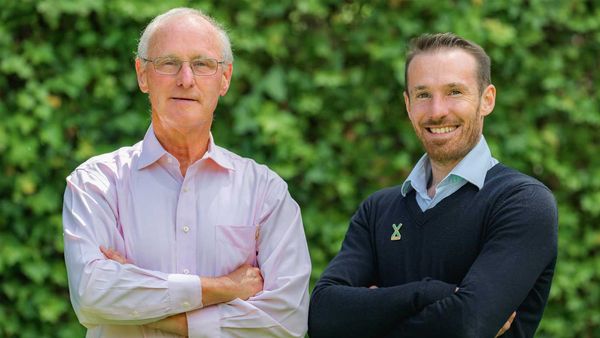
Healx
$47m Series C (August 2024)
About: Founded in 2014, Healx is an AI-enabled clinical-stage biotech company specialising in rare diseases.
Latest funding: $47m Series C in August 2024. The latest round takes Healx’s funding haul since inception to $110m. The new financing has been co-led by Silicon Valley-based R42 Group and Atomico, one of Europe’s largest venture capital firms, with participation from new and existing investors including Balderton, Jonathan Milner, Global Brain, b2venture, Ayana Capital, o2h and VU Venture Partners.
Industry partners: Healx has an investment agreement with its long-term research partner, Children’s Tumor Foundation. Other partners include AstraZeneca, Ovid Therapeutics and Boehringer Ingelheim.
History: Prior to co-founding Healx, Dr Tim Guilliams obtained his PhD at the University of Cambridge in the field of Biophysics and Neuroscience, developing nanobody technology for Parkinson’s disease.
Today: The latest funding will be used to advance Healx’ pipeline of medicines in rare oncology, renal and neurodevelopmental disorders, including advancing its lead program HLX-1502 through a Phase 2 clinical trial for the treatment of neurofibromatosis Type 1 (NF1).

Prospectral
$1.2m pre-seed (August 2024)
About: Prospectral has designed a new approach to spectral imaging and is building a technology to empower companies with dramatically lower-cost, more compact and less complex cameras for gathering the data required to detect and analyse materials.
Latest funding: In August 2024, Prospectral raised a $1.2 million pre-seed round from Creator Fund, Unruly Capital and Cambridge Enterprise Ventures.
History: Prospectral was founded by four University of Cambridge researchers in optical physics and semiconductor engineering. The quartet leading the business are Dr Gwen Wyatt-Moon, who is CEO; Dr Tom Albrow-Owen (CTO); Dr Oliver Burton (CSO) and Dr Peter Christopher (CIO).
Today: The pre-seed funding will fuel development of the company’s cutting-edge image sensor technology – enabling ultra-compact cameras for materials detection and analysis.
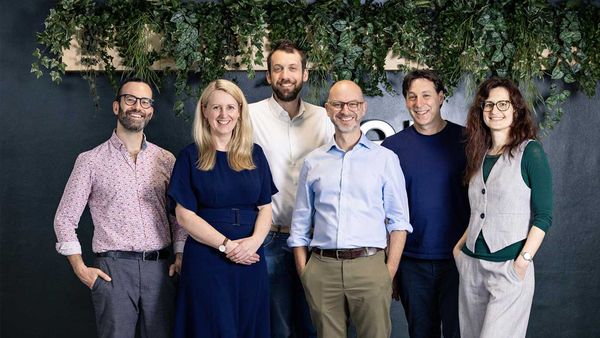
Riverlane
$75m Series C (August 2024)
About: Riverlane partners with many of the world’s leading quantum computing hardware companies, labs and governments and is backed by the University of Cambridge and leading technology VC firms.
Latest funding: $75m Series C in August 2024 led by Planet First Partners, a European growth equity sustainable investment platform, with participation from sustainability venture capital investors ETF Partners and Singapore-based global investor, EDBI. Existing backers Cambridge Innovation Capital, Amadeus Capital Partners, the UK’s National Security Strategic Investment Fund and HPC leader Altair also participated.
Industry partners: Leading quantum computing companies and government bodies, including Rigetti Computing, Alice & Bob, QuEra Computing, Infleqtion, Atlantic Quantum and national labs such as Oakridge National Lab in the US and the UK’s National Quantum Computing Centre (NQCC).
History: Riverlane was founded in 2016 by Steve Brierley, a senior research fellow in computational mathematics at the University of Cambridge. Steve’s own research identified a quantum ‘Moore’s law’ whereby small-scale quantum computers were doubling in power every two years, meaning useful quantum computing at scale could be achievable within a decade. Armed with this evidence, the support of Cambridge University and intensive guidance from Arm co-founder Jamie Urquhart among many others, he founded Riverlane from his kitchen table and has never looked back.
Today: Riverlane has a team of around 100 staff with offices in Cambridge, UK, and Boston, US.
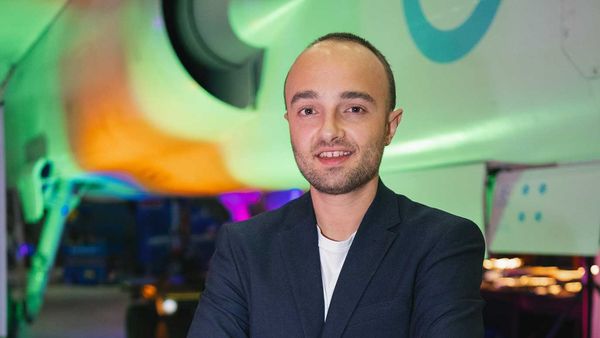
GraphEnergyTech
$1.31m equity (August 2024)
About: GraphEnergyTech has developed and patented a novel process to integrate graphene electrodes into solar cells, replacing the silver and other precious metals whilst retaining or improving power conversion efficiencies and reliability. Other applications for GraphEnergyTech’s technology include batteries, super capacitors, LED lighting and displays.
Latest funding: £1 million ($1.31m) equity raise led by Aramco Ventures, the corporate venturing arm of Aramco, the world’s leading integrated energy and chemicals company.
Industry partners: The company is now working with partners to scale its technology.
History: GraphEnergyTech was co-founded by Professor Michael Grätzel of the Ecole Polytechnique Federale de Lausanne (EPFL), inventor of the dye-sensitised solar cell; Professor Andrea Ferrari, founder and director of the University of Cambridge Graphene Centre, and Frontier IP.
Today: GraphEnergyTech will use the new funding to accelerate development and scale-up of its advanced high-conductivity graphene electrodes.
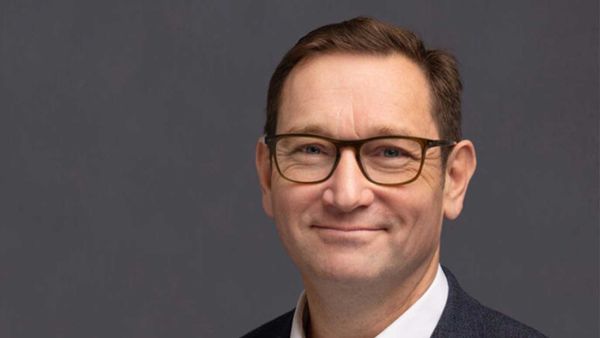
CellCentric
$35m (July 2024)
About: Chesterford Research Park based CellCentric’s mission is to transform outcomes for people living with specific cancers, notably relapsed refractory multiple myeloma, as quickly and effectively as possible.The company has operations in Cambridge and Manchester.
Latest funding: RA Capital Management made $35m investment taking the round to over $60m, as a previous $25m loan note from Pfizer converts to equity. American Cancer Society’s impact investment and innovation arm BrightEdge also backed the round. CellCentric is privately held; its lead investor is Boston-based Morningside Ventures.
Industry partners: Include Pfizer.
History: CellCentric was spun out from the University of Cambridge’s Gurdon Institute by pioneering developmental biologist Professor Azim Surani, who wanted to further explore the potential of chromatin-related cell fate control mechanisms to deliver new treatments. From its origins, CellCentric built a network of research and evaluation relationships with over 25 leading academic research groups worldwide.
Today: The latest investment will be used to further develop CellCentric’s oral p300/CBP inhibitor inobrodib ahead of Phase III trials.
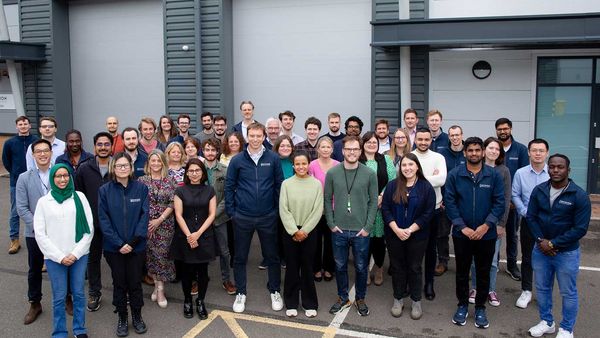
Echion Technologies
$37m (£29m) Series B (June 2024)
About: Echion’s product, the Echion XNO® anode material, enables some of the world’s largest transportation companies to access sustainable batteries with outstanding safety, longevity and fast-charging capability.
Latest funding: £29m Series B investment in round led by specialist battery and energy storage technology investor Volta Energy Technologies (Volta), with participation from existing investors CBMM, BGF, and Cambridge Enterprise Ventures.
Industry partners: Echion is supported by leading venture capital institutions and the world’s largest niobium miner, CBMM.
History: Echion Technologies was born in the labs of the University of Cambridge Engineering Department in 2017.
Today: The Series B investment will enable Echion to execute its go-to-market strategy to see its innovative niobium-based XNO® anode material utilised in real world applications, at volume.
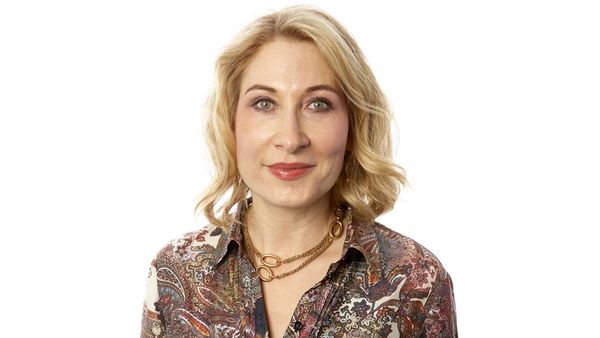
Psyomics
$5.1m (£4m) growth capital (June 2024)
About: By utilising smart algorithms to perform detailed and personalised analysis, Psyomics’ AI-informed medical device Censeo creates a biopsychosocial ‘profile’ of an individual’s mental health needs. Censeo’s in-depth insights allow for a greater understanding of a patient’s personalised needs and treatment pathways, helping achieve their best possible clinical outcome.
Latest funding: Psyomics raised £4m growth capital, with Parkwalk Advisors contributing £3.5 million as lead investor.
Industry partners: Psyomics’ platform Censeo undertook its first commercial year in 2023 with five NHS and private healthcare contracts, including in the Hertfordshire Partnership Foundation Trust, as a Class 1 medical device.
History: Psyomics was spun-out from Cambridge University through the Cambridge Centre for Neuropsychiatric Research (CCNR). Founded by Professor Sabine Bahn, Laboratory Director, Professor of Neurotechnology and practising NHS consultant psychiatrist, CCNR’s internationally recognised team carries out fundamental and applied research into the causes and treatment of major neuropsychiatric disorders.
Today: Psyomics says the fresh funding will help accelerate the extension of the company’s AI-informed medical device Censeo, to include specialist children and young people’s mental health assessment. It says Censeo is transforming how mental health conditions, from serious complex and enduring to common anxiety disorders, are assessed and triaged.
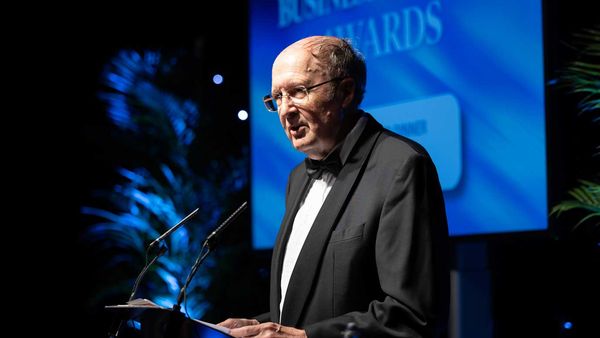
Bicycle Therapeutics
$555m (May 2024)
About: Bicycle is pioneering a new and differentiated class of therapeutics based on its proprietary bicyclic peptide (Bicycle®) technology. It is a transatlantic company, headquartered in the life science clusters within Cambridge, UK and Boston, Mass.
Latest funding: In May 2024, Bicycle unveiled a $555m investment haul on NASDAQ The money from new and existing backers was through a private investment in public equity (PIPE) financing. The financing was led by a US-based healthcare-focused investor with participation from Deep Track Capital, EcoR1 Capital, Fairmount, Forbion, Perceptive Advisors and RA Capital Management.
Industry partners: Bicycle collaborates with a number of partners including Bayer, Cancer Research UK (CRUK), DKFZ and Novartis.
History: The Bicycle technology arose from research at the MRC Laboratory of Molecular Biology (LMB) in Cambridge by co-founders Sir Greg Winter and Professor Christian Heinis. This technology has led to major therapeutic advances in antibody based therapeutics; and bicyclic peptide (Bicycle) drug discovery and development.
Today: Bicycle is continuing to develop its proprietary pipeline. The company had cash and equivalents of $961.4m at June 30, compared to $526.4m at December 31. The increase is primarily due to net proceeds from the PIPE financing plus share option exercises, offset by cash used in operating activities.
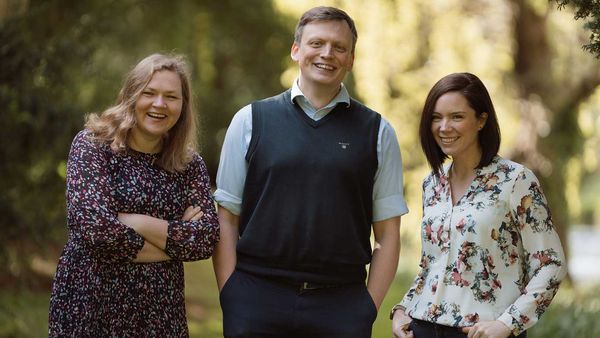
ExpressionEdits
$13m Seed funding (May 2024)
About: The company’s proprietary intronisation technology revolutionises gene design by mimicking the natural genetic landscape. By strategically incorporating multiple short noncoding DNA sequences known as introns into artificial genes, ExpressionEdits has achieved significant enhancements in gene expression which leads to better protein production. The company’s AI-powered platform integrates millions of biological data points with machine learning algorithms, enabling automated optimisation of gene design. This transformative technology empowers ExpressionEdits to predict and prioritise key properties of genes, unlocking the production of previously elusive therapeutic proteins.
Latest funding: European VC firms Octopus Ventures and redalpine co-led the $13m round. BlueYard Capital, Wilbe Capital, Acequia Capital, Amino Collective, and Hawktail also participated.
History: ExpressionEdits was founded in 2021 by Dr Kärt Tomberg, Professor Allan Bradley, and Dr Liliana Antunes based on research from the University of Cambridge. Co-founder Professor Bradley is a serial entrepreneur, founding a number of successful biotechs in the UK and US. He was Director of the world-renowned Wellcome Sanger Institute from 2000 to 2010 when he founded Kymab which was sold to Sanofi in 2021 for $1.45 billion. Prior to this he founded two companies in the United States – Lexicon Genetics in 1995 and Spectral Genomics Inc in 2000. He also founded Cambridge company, PetMedix, which was acquired by Zoetis in 2023, and is currently founder/CEO of Cambridge University spinout T-Therapeutics which raised £48m in Series A funding in November 2023.
Today: The funding will accelerate candidate selection for preclinical studies and develop a pipeline of protein-based therapeutics. The primary focus for the pipeline will be recombinant proteins that have historically faced production and manufacturing challenges based on current technology.
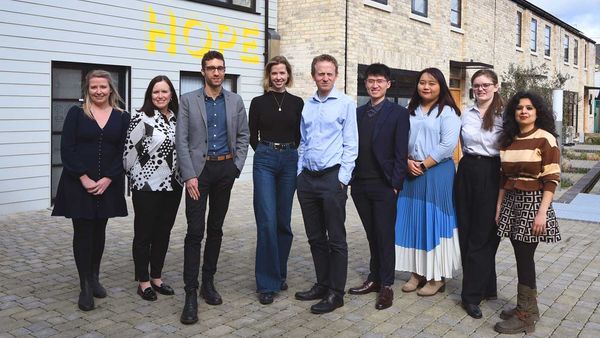
Sparxell
$3.2m early-stage funding (April 2024)
About: Sparxell is commercialising products designed to eliminate synthetic chemicals from colourants in multibillion dollar markets such as cosmetics, fashion, paint and packaging.
Latest funding: $3.2m in early stage capital. The Circular Innovation Fund, a global venture capital fund jointly managed by Demeter and Cycle Capital with L’Oréal as an anchor investor, participated alongside others including SpaceX-backer Future Communities Capital, PDS Ventures, Katapult, Joyance Partners and SNØCAP VC.
Industry partners: The company says it has already engaged in product innovation partnerships with blue-chip companies across different industries including leading car manufacturers, world-leading high-end fashion brands, and cosmetic goods manufacturers.
History: Sparxell was founded in 2022 by Cambridge scientists, led by CEO Dr Benjamin Droguet and Professor Silvia Vignolini, who discovered ways to replicate vibrant colours in nature using fully plant-based cellulose, a renewable, biodegradable resource that can be extracted from waste streams. It spun out from the University of Cambridge after years of research on photonics and structural colours obtained from plant-based cellulose, with a mission is to eliminate toxic chemicals from colouration and provide businesses with sustainable, low-carbon and performant alternatives to traditional coloured materials.
Today: Sparxell is targeting specific markets including beauty (colour cosmetics, personal care, creams, sunscreens, glitter make-up), fashion (textile colouring, embellishments, sequins), packaging (bulk colouring, films, foils), and paint (automotive, building). It is planning to launch a Series A in the near future to upscale production capacity and accelerate commercialisation.
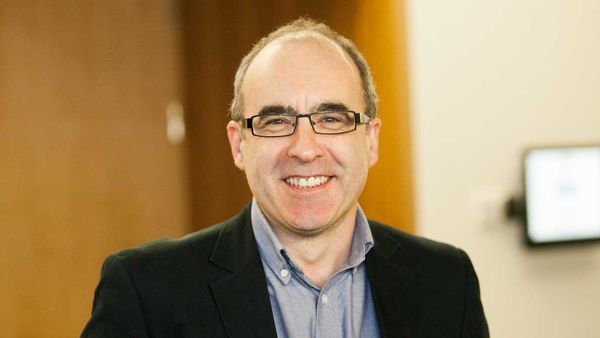
Mission Therapeutics
$32.18m (£25.2m) (March 2024)
About: The company is developing first-in-class therapeutics that enhance mitophagy to promote cell/organ health.
Latest funding: The new financing round was jointly led by existing investors Pfizer Venture Investments, Sofinnova Partners, Roche Venture Fund, SR One, IP Group, and Rosetta Capital. To date the company has received £117m/ $149m in venture capital from this blue chip syndicate.
Industry partners: The company has a collaborative, science-driven culture and has strong collaborations with key academic and research centres. These include the Michael J Fox Foundation, the Gurdon Institute Cancer Research UK Laboratories at the University of Cambridge, the Oxford Parkinson’s Disease Centre at the University of Oxford, and the Wellcome Trust Mitochondrial Research Centre at Newcastle University.
History: Professor Sir Steve Jackson’s research and discoveries in protein ubiquitylation and deubiquitylation led to the founding of Mission in 2011. He is the University of Cambridge Frederick James Quick Professor of Biology and Senior Group Leader at the Cancer Research UK Cambridge Institute and Associate Group Leader at the Gurdon Institute. As a pioneer in the field of DNA repair and DNA-damage signalling, Prof Jackson’s research has shaped our understanding of cellular responses to DNA damage and of how defects in these responses contribute to disease. Steve founded KuDOS Pharma that was acquired by AstraZeneca in 2006. Blockbuster drug Olaparib, developed by KuDOS, was approved for advanced BRCA+ ovarian cancer in USA and Europe in 2014.
Today: Mission plans to use the new funding to accelerate development of its lead drug candidates, MTX325 and MTX652, through clinical trials. MTX325, a CNS penetrant which is a potential disease-modifying treatment for Parkinson’s Disease, is about to enter Phase I trials; while peripherally-restricted MTX652 is currently in Phase II investigating acute kidney injury (AKI) associated with cardiac surgery.
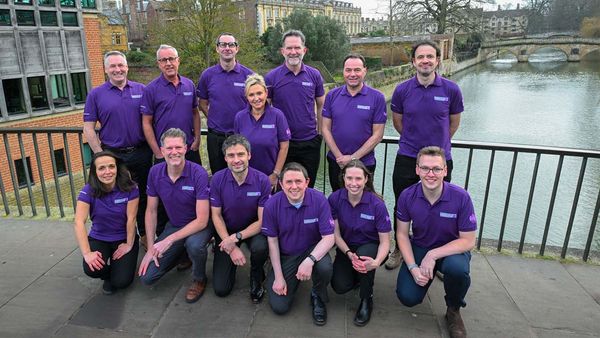
Cambridge Mechatronics Ltd
$40m growth funding (February 2024)
About: Cambridge Mechatronics Ltd (CML), which has over 700 patents pending and granted, is the world’s leader in the design and control of Shape Memory Alloy (SMA) actuators.
Latest funding: $40m round in February led by Atlantic Bridge – with Intel Capital and Supernova as co-leads and further participation from Sony Innovation Fund. CML has previously been funded by high-net-worth individuals, family offices and trade partners.
Industry partners: CML has designed, developed and licensed actuators to provide Autofocus (AF) and Optical Image Stabilisation (OIS) to a range of top-tier smartphone manufacturers.
History: Dr Tony Hooley, a University of Cambridge, Cavendish Laboratory, astrophysics PhD founded 1… Ltd, where he designed and patented the Digital Sound Projector, which first Pioneer (Japan), and then Yamaha (Japan) licenced. 1… Ltd then worked on cellphone-camera autofocus and OIS devices using novel SMA technology and under its newer name of Cambridge Mechatronics Ltd the technology has been used in millions of products including the Huawei flagship smartphone ‘P40’.
Today: CML plans to grow headcount this year, mainly focused on chip design and advanced control algorithms, but also adding heads to the China and Korea operations in its global network of operations.
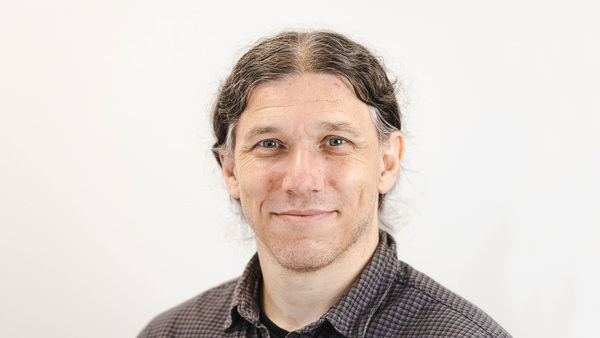
Zetta Genomics
$2.37m second seed round (February 2024)
About: Zetta Genomics is a fast-scaling, global genomics data technology company. As genomic databases move from hundreds of thousands to millions of sequences, Zetta Genomics’ XetaBase tool brings simplicity to increasing complexity with a genomic data management solution developed by and for researchers and clinicians.
Latest funding: In February, Zetta Genomics expanded its second seed round, attracting new investment of £1.8m. It saw commitments from second-round global investors Nina Capital, Apex Ventures and Cambridge Enterprise. The expansion also attracted fresh investment from diagnostics startup specialist We Venture Capital.
Industry partners: XetaBase enables the company to collaborate with healthcare systems, life sciences companies, research institutions and global HealthTech innovators.
History: Zetta Genomics is a 2018 spin out from two genomic data pioneers, the University of Cambridge and Genomics England. XetaBase was inspired by the realisation early in Genomics England’s 100,000 Genomes Project that existing technologies couldn’t cope with genomic data’s volume, complexity and reinterpretation demands. It drove the development of OpenCB, led by co-founder Ignacio Medina, and the creation of Zetta Genomics.
Today: With £6.2m secured over two years, Zetta is continuing to scale its global operations and customer offerings to help transform precision medicine and personalised healthcare. The company is working towards a significant Series A round.
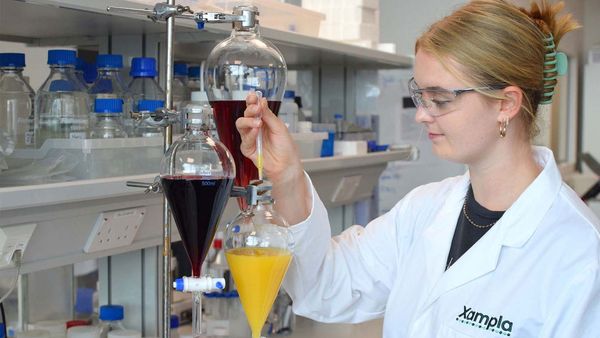
Xampla
$7m scaleup funding (January 2024)
About: Founded in 2018, Xampla is on a mission to be a world-leading provider of natural polymers with its world-first next-generation Morro™ materials, which offer a high-performance replacement for plastic.
Latest funding: $7m from existing backers Amadeus Capital Partners, Horizon Ventures, Cambridge Angels, Cambridge Enterprise, Martlet Capital and new investor CIECH Ventures, taking its haul to date to $17.6m.
Industry partners: 2M Group of Companies, Britvic, ELEMIS, Yili and Gousto.
History: Xampla’s patented technology was developed over 15 years by Professor Tuomas Knowles, a global leader in protein biophysics and Professor of Physical Chemistry and Biophysics at the University of Cambridge.
Today: The new investment will be deployed to advance production of the nextgen materials company’s biodegradable, plant-based Morro materials – helping big brands to move away from single use and highly damaging plastic.
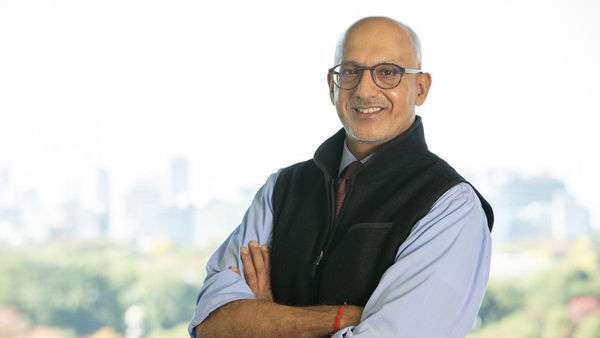
Quantinuum
$300m (January 2024)
About: Quantinuum unites best-in-class software with high-fidelity hardware to accelerate quantum computing. With integrated full-stack technology, its world-class scientists are rapidly scaling quantum computing.
Latest funding: The $300 million raise in January 2024 was revealed by Quantinuum major shareholder Honeywell, which invested as co-anchor alongside JPMorgan Chase, Mitsui & Co., Ltd and Amgen.
Industry partners: Quantinuum’s technologies are used by leading companies including Airbus, BMW Group, Honeywell, HSBC, JPMorgan Chase, Mitsui and Thales. In collaboration, these organisations are exploring how to engineer and scale quantum capabilities to help solve some of world’s most challenging problems – from designing and manufacturing hydrogen cell batteries for transportation, to developing materials to sequester carbon safely from the atmosphere to support the world’s energy transition. Earlier this year Quantinuum announced that it had been selected by the Japanese national agency Riken to provide on-premises access to its H series quantum computers.
History: Cambridge Quantum Computing (CQC) was founded in 2014 as an independent quantum computing company through the University of Cambridge Judge Business School’s ‘Accelerate Cambridge’ programme. Quantinuum is the combination of the quantum hardware team from Honeywell Quantum Solutions (HQS) and the quantum software team at CQC. By coming together as Quantinuum, the company offers an integrated, end-to-end quantum platform.
Today: Quantinuum recently signed a Memorandum of Understanding with Singapore’s National Quantum Office, Agency for Science, Technology and Research (A*STAR), National University of Singapore, National Supercomputing Centre enabling access to Quantinuum’s advanced quantum computer,and to explore and collaborate on quantum computing use cases, focusing on computational biology.
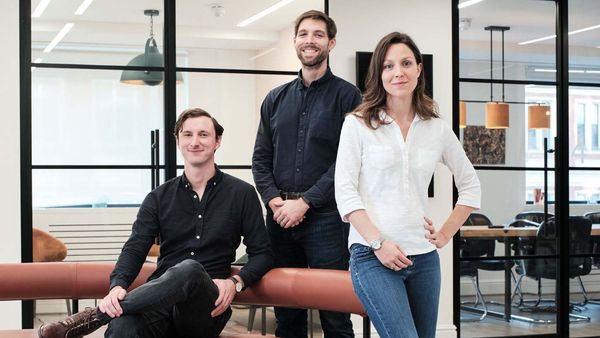
Sano Genetics
$11.4m growth funding (January 2024)
About: Sano Genetics is developing software to enable the precision medicine revolution. The company combines genetic testing, recruitment, and long-term engagement in one platform, accelerating enrolment and simplifying operations for precision medicine teams driving breakthroughs for patients.
Latest funding: $11.4m in new funding, led by Plural with participation from existing investors including MMC Ventures, Episode 1 and Seedcamp. The new funding brings the total raised by the company to $22m.
Industry partners: Now serving four of the top 20 pharmaceutical companies.
History: Sano’s co-founders Patrick Short (CEO), Charlotte Guzzo (COO) and William Jones (CTO) met while working on their PhDs at the University of Cambridge.
Today: In 2023 alone, Sano Genetics experienced 5x ARR growth year-on-year, doubled its headcount to 62 and expanded into the large pharmaceutical market. The new funding will be used to meet the growing demand for its products, leverage AI further and expand its reach to more countries, becoming the ultimate precision trial platform.
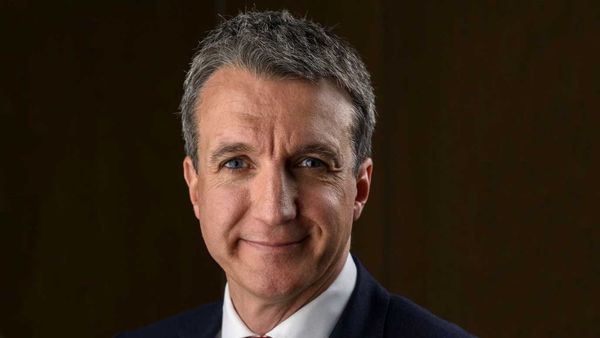
Apollo Therapeutics
$33.5m added to Series C (January 2024)
About: Apollo Therapeutics is a portfolio biopharma company headquartered in Cambridge, UK, with US operations in Boston. Apollo translates breakthroughs in biology and basic medical research into innovative new medicines. With over 20 active therapeutic programs, five of which are in development, it is building a large, diversified portfolio of novel therapeutics with uncorrelated risk.
Latest funding: In January 2024, Apollo announced it had completed a second close of its Series C financing, raising another $33.5m to bring the total raised in the round in 2023 to $260m. It has raised more than $450m since inception in 2016. The Series C was led by Patient Square Capital in California and included participation by multiple new investors including M&G plc and two of the largest US public pension plans, along with existing investors including Rock Springs Capital.
Industry partners: Apollo has over 15 active drug discovery and pre-clinical therapeutic programs, almost all of which are based on breakthroughs in biology and basic medical research made at its partner universities and institutions.
History: Apollo Therapeutics was initially founded in 2016 as a joint venture partnership between three of the world’s leading research universities (University of Cambridge, UCL, and Imperial College) and three of the world’s top pharma companies (Johnson & Johnson, GSK and AstraZeneca). The aim then, as now, was to create innovative new medicines by matching breakthroughs in basic medical research made at the universities with industrial drug discovery experts hired into Apollo Therapeutics.
Today: In July 2024 Apollo and the University of Oxford announced the signing of a drug discovery and development collaboration aimed at translating breakthroughs made by biomedical researchers at Oxford.
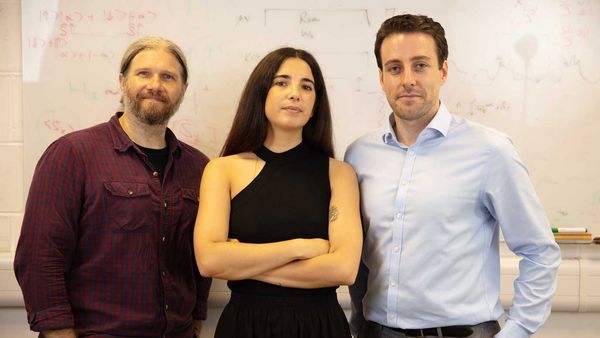
Nu Quantum
$9.24m (£7m) pre Series A (November 2023)
About: University of Cambridge spin-out Nu Quantum is pioneering the development of scalable quantum networking, essential to delivering useful quantum computing and unlocking the full spectrum of applications that will have a transformative impact on society.
Latest funding: In November 2023, Nu Quantum raised £7m in a pre-series A round to accelerate its mission to build the entanglement fabric essential to scale quantum computers. The round was led by Amadeus Capital Partners, Expeditions Fund, and IQ Capital, with increased commitment from Seed investors Ahren Capital; Seraphim Capital; University of Cambridge and Martlet. New investors joining the round include Presidio Ventures backed by Sumitomo Corporation, the National Security Strategic Investment Fund (NSSIF), and Deeptech Labs.
Industry Partners: Nu Quantum has key partnerships with academia and corporations, including Airbus, NPL, BT and The University of Cambridge.
History: Nu Quantum was founded in 2018 to commercialise research generated over the last decade at the Cavendish Laboratory. Backed by world-class investors, Nu Quantum brings together a strong IP portfolio and multi-disciplinary team to turn research into distinctive, valuable and market-led solutions.
Today: Nu Quantum’s product is a Quantum Networking Unit (QNU) capable of efficiently scaling discrete Quantum Processing Units (QPUs) to form a larger and more useful quantum computer. Nu Quantum’s technology is interoperable with, and can be applied to, different qubit modalities, and will accelerate the time to market of transformative quantum computing.
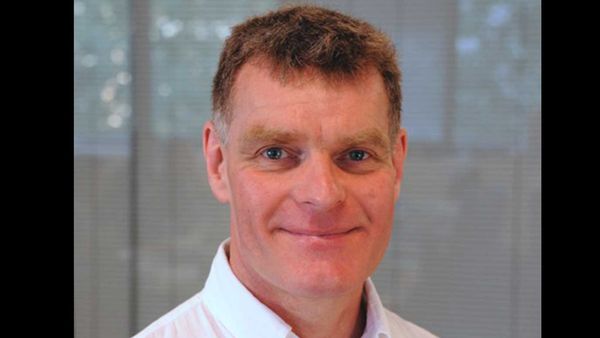
T-Therapeutics
$59m (£48m) Series A (November 2023)
About: T-Therapeutics is a biotechnology company developing next-generation TCR therapeutics designed to reshape the clinical landscape for cancer patients. The company has developed a proprietary transgenic mouse platform, OpTiMus®, which creates an almost unlimited repertoire of ‘optimal’ TCRs as building blocks for pioneering therapies.
Latest funding: Last year, T-Therapeutics raised $59m (£48m) in a Series A financing led by Sofinnova Partners, F-Prime Capital, Digitalis Ventures and Cambridge Innovation Capital (CIC) with participation from Sanofi Ventures and the University of Cambridge Venture Fund.
History: Spun off from the University of Cambridge and led by Founder and CEO Professor Allan Bradley, T-Therapeutics was created to harness the power of T cell biology, evolved over millions of years, to create safe and effective treatments for many cancers and autoimmune diseases. The team at T-Therapeutics includes highly experienced antibody engineers and drug developers who were responsible for the creation of the Kymab and PetMedix antibody discovery platforms and pipelines.
Today: The company recently appointed biopharma industry veteran Dr David Hung as Chairman. Dr Hung is a hugely successful serial entrepreneur in the oncology space. He founded Medivation in 2003 which was sold to Pfizer for $14.3 billion in 2016. At Medivation, Dr Hung identified, in-licensed and led bench-to-bedside development of enzalutamide (XTANDI®) for advanced prostate cancer, taking it from first in vitro laboratory experiment to FDA approval in seven years, one of the fastest development timelines in pharmaceutical history.
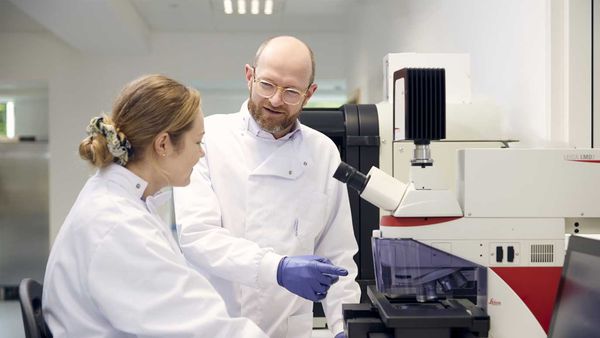
Quotient Therapeutics
$50m (November 2023)
About: Founded by Flagship Pioneering in 2022, Quotient Therapeutics heralds itself as the first company to systematically study the genetic variation and evolution of the trillions of cells inside the human body. The company’s Somatic Genomics platform reveals novel links between genes and disease across a broad range of therapeutic areas, enabling the discovery of transformative medicines intended to cure, prevent, or reverse disease.
Latest funding: Flagship has made an initial commitment of $50 million to advance development of the company’s platform. Created by Flagship scientists in partnership with leading geneticists at the Wellcome Sanger Institute and the University of Texas Southwestern, this platform is able to study natural selection at the cellular level through four steps: phenotyping of cells from clinical tissue samples, isolation, single cell genotyping, and computation.
History: Quotient Therapeutics is co-located in Cambridge, MA and Cambridge, UK with research facilities in both cities. Academic co-founders of Quotient include Professor Sir Mike Stratton (Senior Group Leader, Wellcome Sanger Institute), Inigo Martincorena (Group Leader, Wellcome Sanger Institute), Peter Campbell (Head of Cancer, Aging and Somatic Mutation, Wellcome Sanger Institute), and Hao Zhu (Professor, University of Texas Southwestern).
Today: In August 2024, academic co-founder Peter Campbell was appointed Chief Scientific Officer at Quotient.
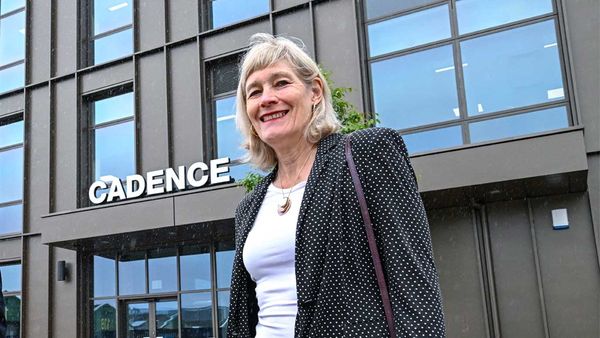
ViaNautis
$25m (£20m) Series A (November 2023)
About: ViaNautis is a globally focused biotechnology company advancing its mission to create value through the development of genetic nanomedicines. Its polyNaut® platform applies advanced polymer materials and in silico screening to precisely guide genetic molecules such as pDNA, mRNA, siRNA and ASOs to their intended targets. Unlike conventional drug delivery methods, polyNaut® tackles the challenge of transporting genetic materials across biological barriers, advancing medicines for conditions with pressing unmet clinical needs, such as Cystic Fibrosis – a multisystemic disease affecting the lungs, pancreas, and other organs – and central nervous system (CNS) diseases.
Latest funding: ViaNautis’ $25m Series A fundraise was led by 4BIO Capital, BGF and UCB Ventures with the additional participation of the Cystic Fibrosis Foundation, Eli Lilly and Company and existing investors including Origin Capital, Meltwind and O2H.
Industry partners: The company’s pipeline includes VNS002, supported by the Cystic Fibrosis Foundation, focusing on identifying optimal formulation candidates for targeted delivery to the conducting airways in the lungs. The company is actively building an internal pipeline and collaborating with leading pharmaceutical and biotech companies to unlock the potential of promising genetic molecules as well as new therapeutic platforms.
History: ViaNautis was established in 2018 as SomaServe, a spin-off from UCL by founders Dr Francesca Crawford, Professor Guiseppe Battaglia and Dr Denis Cecchin.
Today: The proceeds from the Series A round will fuel the rapid development of products using the polyNaut® platform, expand the scientific and management teams and establish industry-leading laboratory facilities. In May 2024, Vianautis signed a 10-year lease for 10,825 sq ft of first floor laboratory, write up and office space within the Cadence building at Unity Campus in Cambridge.
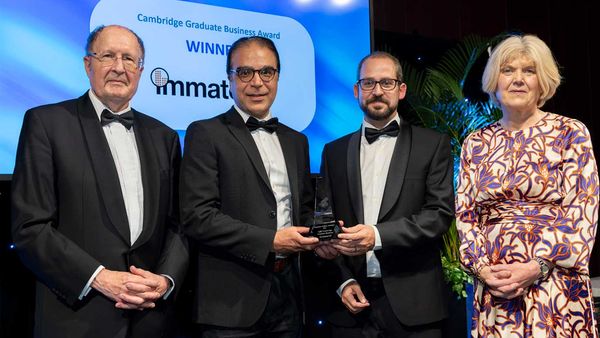
Immaterial
Undisclosed Series A (September 2023)
About: Immaterial is focused on decarbonising the world and enabling the energy transition with its advanced materials and systems design for carbon capture from point source and efficient low-cost innovative hydrogen storage.
Latest funding: The undisclosed Series A funding round was led by SLB, with participation from AP Ventures, Cepsa, Chevron Technology Ventures, Energy Revolution Ventures, JERA Co., TRIREC and Ultratech Capital Partners, and existing investors including long-term investor and Chairman of Immaterial Ltd, Jogchum Brinksma.
Industry partners: Immaterial is now laser-focused on delivering its inaugural carbon capture and hydrogen storage demonstrators to collaborating partners’ sites.
History: Immaterial was founded by Andrew Marsden, David Fairen-Jimenez and Tian Tian at the University of Cambridge.
Today: The Series A funding marked a crucial milestone for Immaterial by enabling the building of a manufacturing demonstration plant to supply large quantities of monolithic materials for customer-based demonstrators (carbon capture and hydrogen storage).


